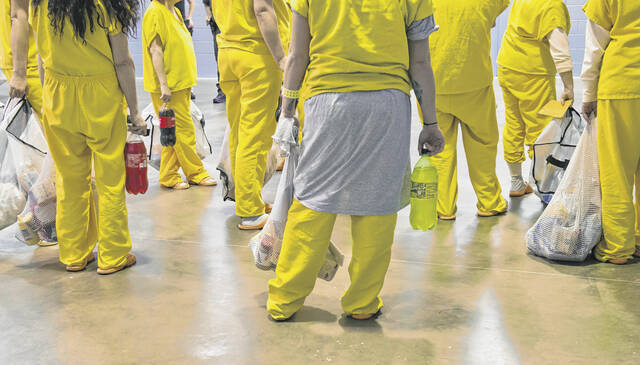In Johnson County, jail navigators may be overlooked, but they play an important role in making sure people released from prison are successfully reacquainted with life on the other side.
Kaitlyn Wheat has one very important job — to make sure when inmates are released from jail, they never come back.
Wheat started in her newly-formed position at the Johnson County jail in 2020, when the county received a $60,000-a-year grant from the Indiana Office of Court Services. The grant covers Wheat’s salary and benefits. Wheat, who started working in probation in 2017, took her knowledge of the department to the new position, building a network of resources for former inmates to connect with to find transportation, mental health support, substance abuse prevention, job opportunities and housing.
Through working with organizations such as Cardinal Recovery, Access Johnson County, the Lord’s Cupboard, IndyGo, Adult and Child, KIC-IT, local food and clothing centers, and apartment complexes and companies that house and hire people with felonies, Wheat helps inmates avoid re-incarceration, she said.
“I mainly assist offenders transitioning out of the jail into the community by looking at what their highest-risk needs are,” Wheat said. “It could be homelessness or they need substance abuse treatment. We locate that first and then work our way down to the second- and third-highest need, whether it be long-term housing, transportation or food.”
Meeting the needs of people who are transitioning to life outside of jail decreases the chances they will fall back into the same circumstances that led to them going to jail in the first place, said Angela Morris, Johnson County’s chief probation officer.
“The offenders in jail had these problems they didn’t have the resources for until they got out of jail,” Morris said. “It seems like we were setting them up for failure if they were released and had these problems to sort through. We can address some of the needs before they get out of jail. … The jail staff saw these needs, the mental health issues and other needs the offenders had.”
Since most jobs won’t hire people who have felony convictions, finding a job can be one of the toughest obstacles for people after they’re released from jail or prison, Wheat said.
“It’s a huge barrier, unfortunately,” she said. “It really prevents the offender from transitioning to be a productive member of society. No one will hire them and they can’t get sustainable employment or housing and the cycle continues. Having barriers in terms of long-term success, sometimes they are set up to fail, but we have a lot of local employers willing to hire people who have criminal backgrounds or are on probation. Others are completely turned away.”
Some companies that hire people with felonies include large ones in Johnson County, such as KYB and Energizer, Wheat said.
For substance abuse treatment, the probation department has a partnership with Cardinal Recovery in Franklin. Health insurance typically covers the cost of the treatment, and the treatment center also provides scholarships to cover costs for the uninsured, said Courtney Matthews, Cardinal Recovery’s executive director.
“A huge piece of it is helping people become more stable. People that are experiencing substance abuse issues and are in and out of the criminal justice system typically are not able to stay employed, and have family and housing problems. If they qualify for a (partial hospitalization) program, we offer housing temporarily while they begin to learn skills in their early recovery, getting treatment in our office while providing the housing piece to reinforce a good routine and making healthier choices,” Matthews said.
“I think a huge part of what’s important in early recovery is peer support, being in a home or program where people are going through similar experiences, and being able to support each other and go through a lot of change to enjoy life being sober.”
Accountability and removing people from previous environments, such as ending contact with people who serve as negative influences, also help in recovery, she said.
Since the jail navigation program started less than two years ago, there isn’t yet sufficient data on how many people succeed long term without ending up back to jail, but the first impression of the program is one of success, Wheat said.
“When offenders are transitioning to supervision, I’ve seen bigger success in terms of them doing well on probation or home detention,” she said. “Their needs are being met with almost everyone I work with.”
The road to success begins with taking mental health seriously, said Duane Burgess, Johnson County sheriff.
“We’re taking mental health seriously in Johnson County,” Burgess said. “We’re trying to do what’s best to stop recidivism to get them the help they need. We’re going to use this (program) to the fullest potential we have at our disposal.”





